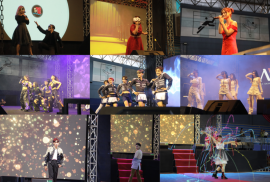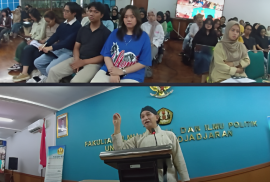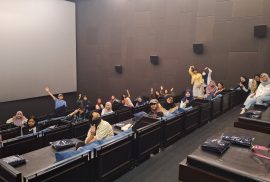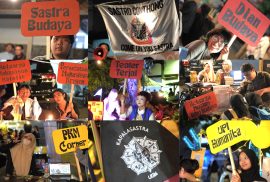A popular annual event organized by students of the Korean Language and Culture Undergraduate Program at Universitas Gadjah Mada, Korean Days UGM returns with the title “Cue The Stage: Uncovering the Covered K-Culture” with the main concept of ‘Theater Arts’. This event has been held for two days, namely on November 9 and 10, 2024 at Gor Lembah UGM. The 19th Korean Days this time was filled with various activities that showed the exploration of other Korean cultures that were no less exciting. Various kinds of interesting activities can be felt by all visitors at the 19th Korean Days UGM this year which presents a lot of spectacular activities.

On the first day, various competitions were held. The titles of the competitions held include, “Sing Cover Competition: Call The Angel Voice”, ”Dance Cover Competition: Let The Dancers In!”, ”Fanart Competition: The Chosen Artist”, and last but not least, this year’s inaugural ”Dress-walk Competition: Spot The Camera!” where visitors were spoiled with the unique and beautiful appearance and creativity of the participants.

Continued on the second day which is the highlight of the event that will be enlivened by various performances ranging from Taekwondo martial arts performed by UKM Taekwondo UGM, and the first joint appearance by dongari (club) Language and Culture UGM which is displayed in the form of drama performances filled by Samulnori, Hancamchum, Talchum, Katarsis, and also Buchaechum.


The event was also attended by talents and competition winners, as well as the much-anticipated Random Play Dance. The main guest star performances were topped off by boy group AXE, Indonesian idol Malvin, and singer and influencer Chris Andrian.
The event ended with a night of Noraebang (Karaoke) hosted by Maze Culture. There were also traditional game and hanbok booths, Food Bazaar, and Fanart Exhibition.

The success of the 19th Korean Day cannot be separated from the support of the sponsors, namely KT&G, Korea Foundation, PT PLN (Persero), PT TKG Taekwang Indonesia, King Sejong Institute, CV Sweat Gigs Indonesia, PT Waskita Karya (Persero) Tbk, Woori Saudara Bank, BPJS Employment, Sari Roti, BSM Rental Yogyakarta, IFrame Rental and Orent Kamera, Momu Photobooth, Belikopi, Artatix, and support from 45 media partners.
The 19th Korean Day series of events is expected to provide great benefits in introducing Korean culture in depth to the entire community. Through this activity, participants not only enjoy entertainment, but also gain insight into Korean traditions, arts, and cultural values that may not be widely known. Also, in the future, it is hoped that this event will continue to be a more inclusive and innovative platform, so that more parties can be involved. With the spirit of sustainability, Korean Day can be one of the events that not only supports cultural diplomacy, but also encourages the growth of appreciation for global culture among Indonesians.






